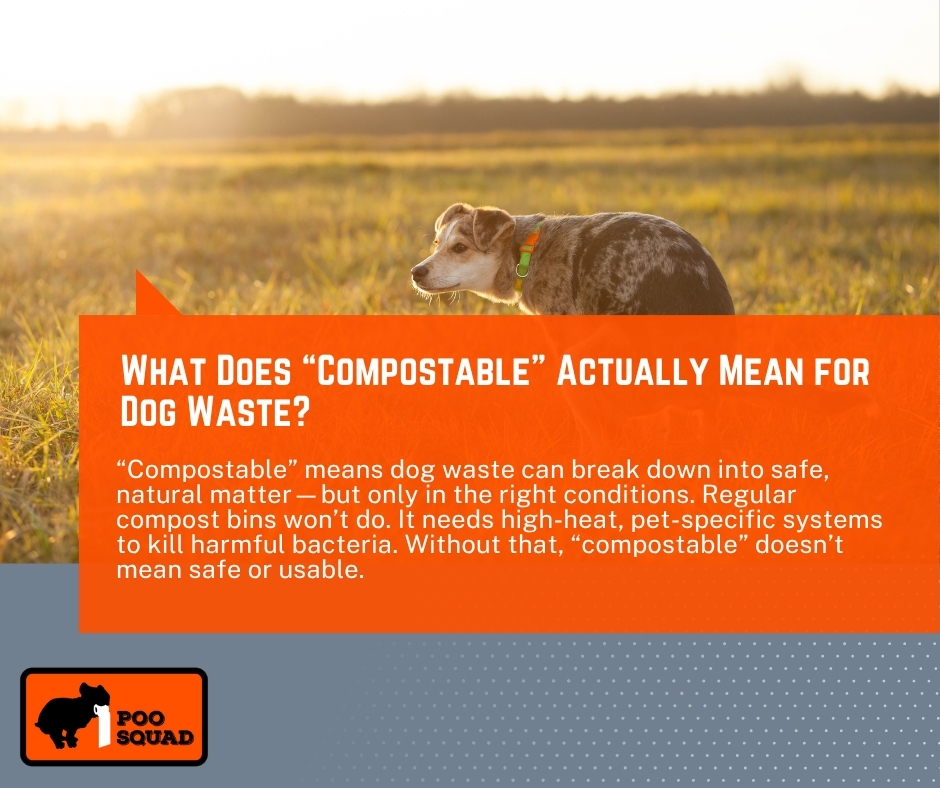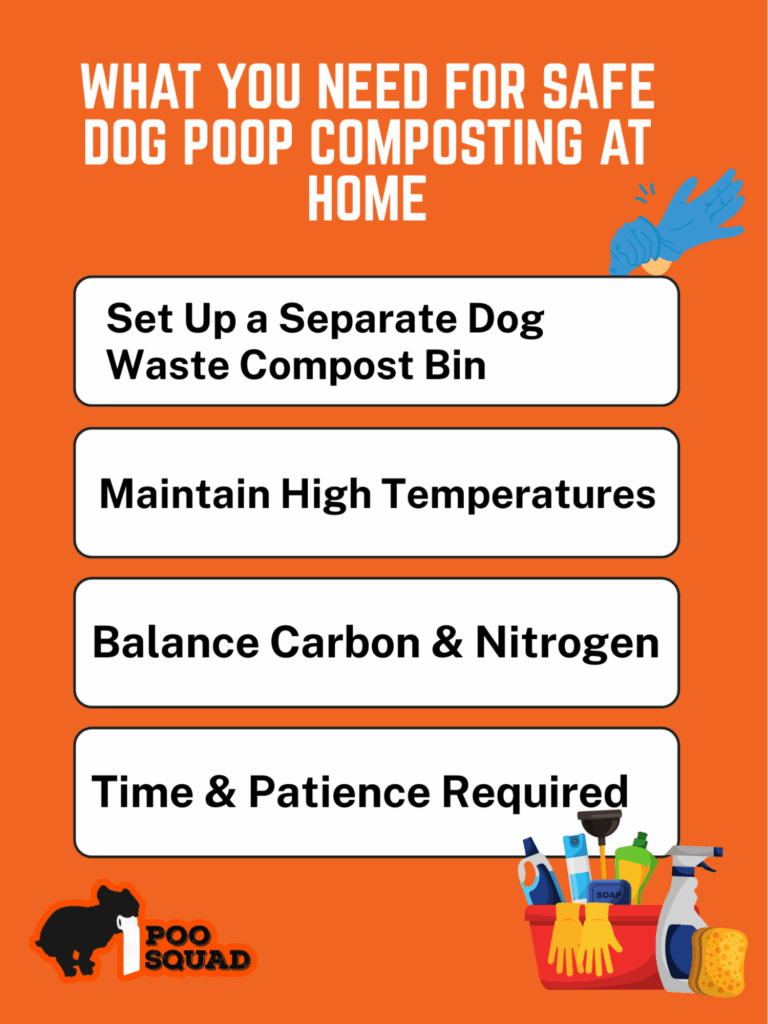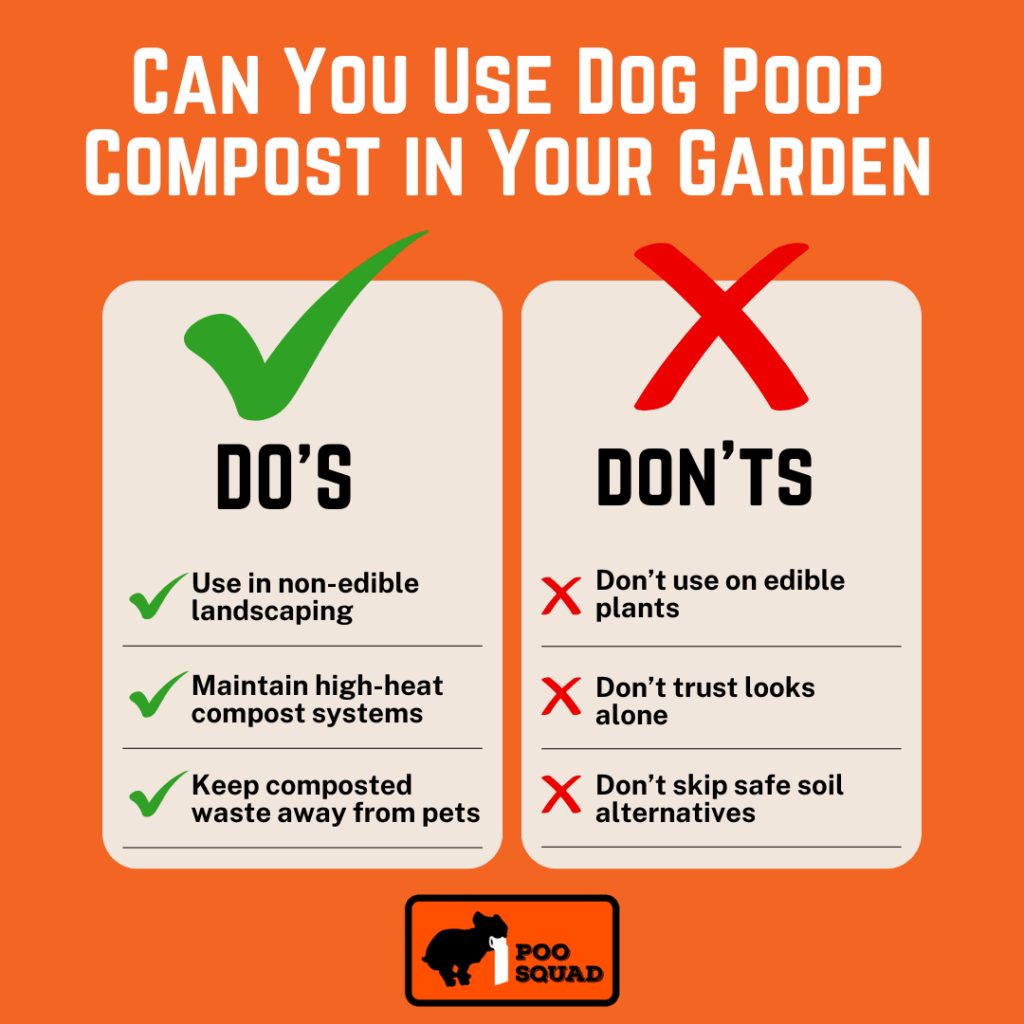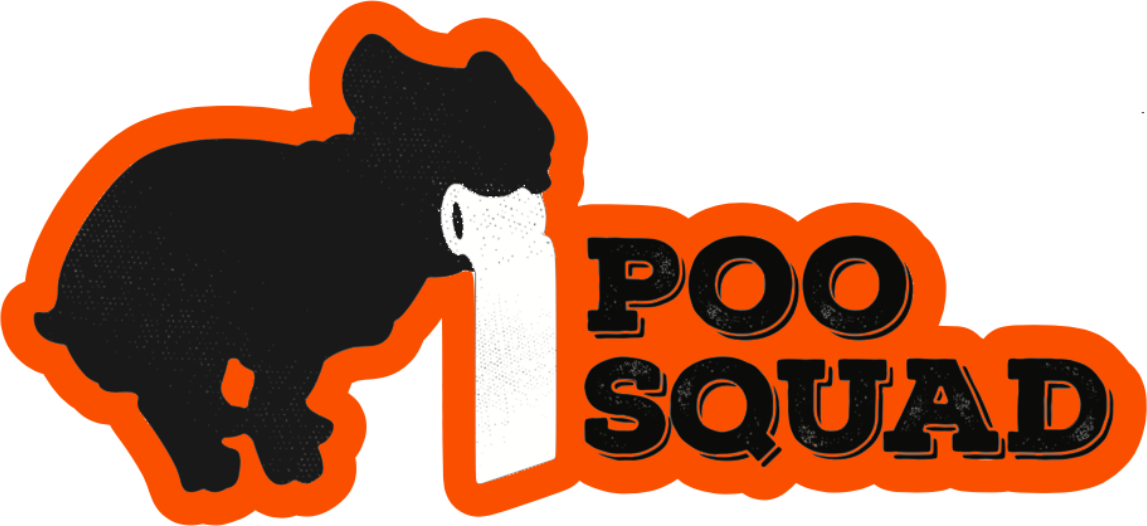Yes, dog poop can be composted, but only in a dedicated, high-heat system, not with food scraps or in backyard compost bins. To do it safely, you need sustained temps of 165°F+, proper isolation, and airtight containment to prevent pathogens from surviving.
Dog poop composting sounds eco-friendly, until you realize most people are doing it dangerously wrong. Unlike cow manure, dog waste is packed with pathogens, parasites, and medication residues that do not break down in a typical backyard compost bin.
One gram of dog poop can contain over 23 million bacteria, including roundworms, E. coli, and more, none of which belong near your tomatoes.
If you’ve been tossing poop in with coffee grounds, hoping a “biodegradable” bag will do the work. Composting dog waste takes more than good intentions. It requires a dedicated, high-temperature system (165°F+), airtight containment, and months of active management to safely neutralize contaminants.
This post breaks down what composting means when it comes to dog waste, why most setups fail, and how to do it safely, if you’re ready to commit.
We’ll also show how professional scoop-and-sanitize services handle millions of turds a year without turning your yard into a science experiment.
What Does “Compostable” Actually Mean for Dog Waste?

Composting means breaking something down into nutrient-rich material through controlled heat, moisture, air, and time. Biodegrading just means it eventually breaks down, even if that takes decades.
And digesting, as in biodigesters, uses microbes to turn organic waste into energy or liquid fertilizer under airtight conditions. Not all dog poop ends up composted. Most of it barely makes it to “break down a little bit.”
Dog poop isn’t the same as cow manure or kitchen scraps. Cows are plant eaters. Dogs?
They eat meat, processed kibble, and sometimes your kid’s socks. That diet produces feces filled with bacteria, parasites, and medications that don’t belong anywhere near a food garden. Just because it came out of an animal doesn’t mean it’s good for the soil.
I just mow it into the yard, it’s fertilizer, right?
Nope. That’s not composting. That’s aerosolizing poop and grinding bacteria into your lawn. Then your dog, your kids, or you track it back into the house. If you’re lucky, the worst thing that happens is your grass dies. If not, you’re looking at potential contamination and a very awkward visit to the vet or doctor.
The truth?
Dog waste can break down, but that doesn’t automatically make it safe, or smart, or something you should handle without knowing what you’re doing.
Why You Should Never Toss Dog Poop in Your Regular Compost Pile
Hey, it’s organic, it’ll break down, right? and tossed dog poop into your compost bin, we need to talk. Composting dog waste safely is not as simple as letting it sit in a pile with your vegetable scraps and hoping for the best.
Dog poop loaded with bacteria like E. coli, salmonella, and campylobacter, plus parasites like roundworms and hookworms. And here’s the ugly truth: some of those parasites can survive even after composting if the conditions aren’t hot enough for long enough. We’re talking sustained temps of 165°F+ to kill off what’s lurking in there.
Your average backyard compost pile?
It rarely gets anywhere close to that. Especially not in cold weather or when you’re tossing in whatever scraps you have lying around. So what you end up with isn’t healthy garden compost, it’s contaminated sludge waiting to be accidentally tracked into your home.
And if you’re thinking about putting that mix near anything edible, think again. Using dog poop compost on fruits, veggies, or herbs doesn’t just break organic gardening rules, it voids certifications and creates a genuine risk to your health. Even ornamental plants don’t benefit if the compost is full of pathogens.
We’ve had more than one customer ask if composting poop might ruin their soil. The short answer: yes, if you do it the wrong way. Pathogens can linger in the dirt long after the pile looks “finished.” The only thing you’ll be growing is regret.
What You Need for Safe Dog Poop Composting at Home

If you’re set on composting dog waste yourself, props for the initiative, but don’t wing it. This isn’t the same as tossing apple cores in a bin and walking away. You’ll need gear, consistency, and a solid stomach.
Set Up a Separate Dog Waste Compost Bin
First rule?
Dog poop gets its system. Never mix it into your garden compost. A lot of DIYers start with simple setups like 5-gallon buckets with drilled holes, or more advanced solar composters that harness sunlight to boost internal temperatures. Whatever method you choose, it has to be contained, and we mean fully.
What bin keeps dogs out?
Anything secure, sealed, and preferably elevated. The last thing you want is your pup digging around yesterday’s leftovers and deciding today’s snack is a round two of that burrito-shaped pile.
Maintain High Temperatures
Next, understand the magic number: 165°F. That’s the threshold needed to kill off the most dangerous pathogens and parasites found in dog feces. Achieving that takes work. Invest in a compost thermometer. Rotate the pile regularly and consider using insulation layers like straw, cardboard, or even an old tarp to trap heat.
If your compost doesn’t get hot, it doesn’t get safe. Simple as that.
Balance Carbon & Nitrogen
Dog poop is nitrogen-rich. Great for feeding bacteria, terrible without the right balance. To neutralize the smell, aid decomposition, and avoid a mushy mess, you’ll need carbon sources: shredded newspaper, sawdust, even dry leaves. The rule of thumb is about two parts carbon to one part poop. Without it, your bin turns into a parasite-filled sludge pile.
Time & Patience Required
Composting dog waste takes 6 to 18 months, depending on your climate, moisture levels, and how consistent you are. Skip a few turns in the pile, and it cools down. Too much rain, and decomposition slows.
We’ve seen what happens when folks try to cut corners, backyards smelling like sewage, mystery puddles near compost bins, and a whole lot of “oops.” There are no shortcuts. If you can’t commit, this might be the moment to consider letting the pros handle the poop pickup and disposal.
The Environmental Case for Composting Dog Poop
When dog waste ends up in the trash, it usually gets sealed in a plastic bag and tossed into a dump where it breaks down without oxygen. That’s called anaerobic decomposition, and it’s a major contributor to methane emissions, a greenhouse gas far more potent than carbon dioxide.
Add in leachate, the toxic liquid that seeps out of landfills and into surrounding soil and waterways, and it becomes clear: your dog’s leftovers are part of a much bigger mess.
That’s why the EPA has floated alternative disposal ideas, like burying pet waste in a trench far from gardens or water sources. It’s not fancy, but it keeps the poop out of the landfill and gives bacteria a better environment to break things down.
There’s also the idea of flushing it, yes, seriously. But that only works in cities with wastewater treatment systems that can handle animal waste. Many municipalities still ask residents not to flush poop because it could overwhelm the system or cause contamination. Always check local guidelines before going that route.
Done correctly, composting can be a more sustainable solution. It reduces methane, avoids the landfill, and if managed properly, turns waste into usable material for non-edible landscaping. That said, it’s not a free pass to cut corners.
Is landfill methane worse than composting?
Yes, when the compost is managed right. But when it’s done halfway, or left to rot in plastic, the impact is just as bad, and maybe worse if it puts your pets or neighbors at risk.
What Happens If You Do It Wrong (And How to Prevent It)
Dog poop composting gone wrong is like building a porta-potty in your backyard without the “potty” part. We’ve seen the horror stories, the smell that hits you from the street, flies swarming like it’s a buffet, and sludge that seeps into the grass when it rains.
A poorly managed compost pile doesn’t just stink, it turns into a bacterial haven. When temperatures stay too low, the pathogens you’re trying to kill multiply instead.
That “earthy” compost smell?
You won’t get that here. You’ll get ammonia, mold, and that unmistakable whiff of regret.
Then there’s the issue of runoff contamination. One heavy rain and suddenly you’ve got waste leaching into your soil, flower beds, or worse, draining toward a stormwater system. That’s not just unsanitary. That’s a public health hazard.
What if it rains before it’s broken down?
Valid question. And the answer is: it can wash bacteria right out of the pile and into your yard unless you’re prepared.
Here’s how to prevent the mess:
- Use a raised bin with good drainage that’s off the ground
- Seal the container properly to block out pests, flies, and curious dogs
- Choose a smart location, away from gardens, water runoff paths, and high-traffic areas
If your system is leaking, attracting animals, or stinking up the block, something’s wrong. And if you’re constantly battling soggy poop soup in a plastic tub, you may want to reconsider the whole DIY route.
Can You Use Dog Poop Compost in Your Garden?

Dog poop compost should never go near anything you eat. That includes your tomatoes, lettuce, and yes, your herb garden too.
Even when the pile looks fully broken down, soil pathogens can still linger. Parasites like roundworms or harmful bacteria can survive improper composting, especially if the system doesn’t maintain consistently high heat. It’s not about what looks decomposed, it’s about what’s still alive in that soil.
Dog poop compost belongs in non-contact areas, places like tree lines, flower beds, or behind-the-scenes landscaping where nobody’s digging, harvesting, or letting the dog roll around. That way, you get the environmental benefit without the health risk.
Can I use it in my herb garden?
No. Not for basil. Not for mint. Not even for that one stubborn rosemary bush that never dies. If it’s edible, skip the pet poop compost and use a clean, safe mix.
Composted dog waste has its place, but it’s not in your salad.
Can Worm Bins or Digesters Be Used?
Some folks turn to worm bins or biodigesters thinking they’re a cleaner, easier way to handle dog poop. In theory, these systems can work, but there’s a catch.
They digest what you feed them, and that includes any medications your dog might be on, heartworm preventatives, antibiotics, and flea treatments. There’s growing concern that these residues may build up inside the worms or in the resulting compost. That’s not exactly the “natural” loop most people are aiming for.
Because of that, worm composting isn’t ideal unless it’s fully isolated from any food-growing systems. Definitely not something you want to cross-contaminate your veggie patch or touching your raised beds.
For folks who want to try it anyway, worm bins work best for small-scale use, maybe for one small dog in a dedicated system far from anything edible. Just know what you’re getting into, and don’t assume it’s the same setup as composting kitchen scraps.
Do heartworm meds kill compost worms?
Safer to keep pet waste and worm farming in separate lanes.
How Poo Squad Handles Poop (And What We’ve Learned From Millions of Turds)
We deal with dog poop all day, every day. Across all kinds of yards, families, and weather conditions. And let’s just say, we’ve learned a few things.
First off, everything gets sanitized. Every tool, every shoe, every time we leave a yard. It’s not just about being tidy, it’s about stopping the spread of bacteria between homes. If one pup is sick, the last thing we want to do is carry that mess to the next customer.
If we spot anything unusual, blood, worms, mucus, odd color, you’ll know. Poop is often the first sign of health trouble, and since you’re paying us to pick it up, you might never see it yourself. We’ve helped customers catch major issues early, just by paying attention to what’s left behind.
We’ve got our language too. “Pudding pups” for dogs with constant diarrhea. “Poocassos” for the colorful ones that eat every crayon or sock in sight. “Sharp shooters” for dogs who always hit the same spot. If you’ve got one, we’ve scooped it.
And yes, we’ve heard every composting question in the book. Most folks are surprised to learn how technical (and risky) it is.
That’s why so many families stick with professional help. Whether it’s saving their lawn, avoiding a fight over whose turn it is, or saving a marriage (true story), this service means more than just a clean yard.
Legal, Local & Municipal Considerations
Before you start digging a compost trench or setting up bins, check your local rules, because when it comes to pet waste, the laws can get weird.
In some areas, backyard composting of dog poop is flat-out banned. Others allow it, but only under specific conditions, like with a sealed container or far from water lines.
Here’s another common misconception: just because a poop bag says “compostable” doesn’t mean it’s suitable for home composting. Many of those bags are only compostable in industrial facilities with sustained high heat. Toss one in your backyard bin, and it’ll likely sit there for months, or longer, barely breaking down.
There’s also the issue of transporting pet waste. In some places, including parts of New Jersey, it’s not even legal for companies to haul dog poop off private property. That adds another layer of complexity when choosing between DIY and professional options.
The safest route?
Look up your local regulations before starting. You may find composting not allowed at all, or that it’s more complicated than you expected.
Poo Squad’s Take: Don’t DIY It If You’re Not All-In
Yes, composting dog poop can work, but only if you’re committed. We’re talking high heat, airtight containment, and a borderline obsession with sanitation. If that doesn’t sound like your weekend vibe, there’s a better way.
We handle this stuff professionally, every yard, every week, every weather forecast.
Want to save time and stay sanitary?
Explore our residential and commercial services. We scoop, sanitize, and leave no trace, except a clean yard and maybe a grinning dog waiting at the gate.
No trash can dumping. No cross-contamination. Just the kind of peace of mind only a well-handled turd can bring.
Still Unsure? Here Are Common Questions Answered
So here’s a rapid-fire breakdown of the questions we hear most:
Can you compost poop with food scraps?
Never. Cross-contaminating pet waste with your veggie trimmings is a health risk waiting to happen. Keep it separate or don’t compost it at all.
Is it true pet poop is worse than human waste?
Yes, in some cases. Pet waste can carry more parasites and medication residues, and it isn’t treated through a centralized system like human sewage.
Can you just leave poop in the woods?
Not if you care about the environment. Rainwater runoff can carry bacteria into waterways, even miles away. It doesn’t disappear just because it’s out of sight.
Why don’t compostable bags break down?
Most of them need industrial composting conditions, high heat, proper airflow, and timed rotation. Your backyard pile doesn’t even come close.
Got more questions? We’ve probably heard them and handled the cleanup afterward.
